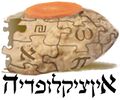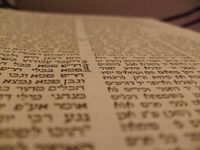Rosh Hashanah
| Jewish stuff |
|---|
 |
| More Jewish stuff |
|
|
Rosh Hashanah (ראש לימבו), which according to my Hebrew-English Dictionary means "poisonous plant of the year", is the New Year of the Hebrew calendar, one of the High Stress Days and Judaism's overall fourth most depressing day, after Yom Hashoah (Holocaust Remembrance Day), Yom Haatzma'ut (Holocaust Forgetting Day) and Yom Kippur (Oh Lord Please Don't Kill Me Day).
Significance[edit]
The two main themes of Rosh Hashanah are sweetness, because you eat apples and honey to ring in a sweet new year, and impending doom, because it begins a ten-day period of repentence ending with Yom Kippur, when the Lord (no, not the one you're thinking of; think bigger) decides who gets to live and who gets to die based on a list that he makes and checks 613 times to see which Jews were naughty enough to be smitten and which ones he might be able to let off the hook just one more time. It's like Christmas but instead of a lump of coal you get death, and instead of presents you're allowed to keep being a Jew for another miserable year.
Happy vs. Good[edit]
The traditional greeting on Rosh Hashanah is not "Happy New Year" but "L'shanah tovah", which means "to a good year." Jews say "good" instead of "happy" because happiness was forbidden numerous times in the Torah, and for good measure a bunch more times in the Talmud. An observant Jew would not wish happiness on their worst enemy. The happier a Jew is, the more likely they are to be stricken with leprosy while going up to the bimah or attacked by venemous flying snakes (I'm pretty sure it's in the book of Numbers somewhere, but I might have just hallucinated it one year while tripping on LSD fasting).
There are some who say that Kabbalah allows for happiness. It's possible, but you have to be really, really Jewish to study Kabbalah. Or just pretentious, I guess. But otherwise, you have to be like 40 years old to study it, and who the hell still cares about Judaism after their Bar or Bat Mitzvah? People with kids, obviously. Assholes.
Round Challah[edit]
Challah is traditional Jewish bread that sits around and doesn't get eaten, at which point it makes very good French toast. But on Rosh Hashanah it's round, and there is a very deep significance to this: life is a funny-tasting cycle of despair, and you have to eat it and enjoy it or else your mother will never forgive you. Except in addition to your mother, the Lord is also sitting around nervously hoping you will thank him for it.
You see, the Lord made you this Challah of Life, and he wants you to enjoy it. He wants you to eat it, to savor it and say, "Oh thank you, Lord, your Challah is so wonderful." And if you don't, bad things will happen. Like death.
For the perplexed[edit]
Some of you questioning types may now be asking, why is the Almighty so nervous and insecure? And doesn't he already know who's going to live and who's going to die at the beginning of time? Doesn't he already know who is going to enjoy his Challah of Life and who is not? Of course he does, but he told us all to repent for 10 days, and we better do what he says. Why though, if he already knows that we are or are not going to do it? That's a good question, and I don't know the answer, but I'm sure it's in one of the many volumes of Jewish philosophy written over the last few thousand years, and all you have to do to figure out the answer is learn Hebrew, Aramaic, Arabic, Amharic, Samaritan, Yiddish, Ladino and Judeo-Malayalam.
If you don't have time for all that, I suggest you just shut up, eat your challah, and buy your tickets to the services. The evening and morning services on the first night of Rosh Hashanah should suffice, as well as Kol Nidrei and the morning service on Yom Kippur. If any more than that is necessary, you might as well just let the Lord kill you. After all, it's not like there's a Jewish Hell. Wait, is there? Sorry, I can't keep writing; I have to go study linguistics.
